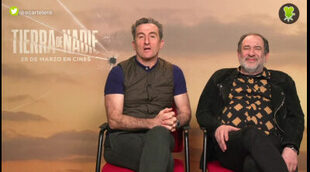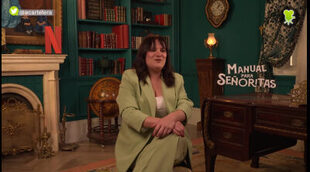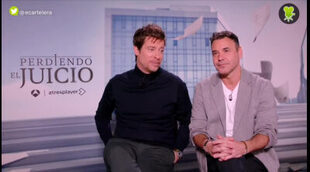'Good Omens' has been a cult classic and a top best selling novel ever since its publication in 1990. It was notoriously described as an "unfilmable" book, but at long last, after nearly thirty years, it has been made into a six-part mini series for Amazon Prime. The entire project was under the direction of Douglas Mackinnon ('Sherlock' and 'Doctor Who'), and adapted for screen by Neil Gaiman, who co-wrote the novel alongside Terry Pratchett.

-

-

-

-

-

-

Starring David Tennant and Michael Sheen in the lead roles of Crowley, the demon from hell, and Aziraphale, the angel, 'Good Omens' follows the unlikely friendship between these two characters as they team up in an attempt to prevent the end of the world. During the promotion in London, we spoke to Gaiman, Mackinnon, and producer Rob Wilkins about the challenges they faced when filming this mega-project.
Filming the Impossible
What was the biggest challenge you faced when creating this project with the money you had?
Douglas Mackinnon: I've been pondering this for a little while. We land at the top end of television budgets, but the far far bottom end of your 'Guardians of the Galaxy', DC, Marvel budgets. But we're trying to make it look like it's a top end so somehow it's a struggle. We had 17/18 days per hour to make this, whereas 'Guardians of the Galaxy' would have had 150 days to do their thing. It was just a balancing act. We were at the top end of television money and yet we kept on running out of money and kept on pushing the ambition, as you always do, higher and higher, because the storytelling is so rich and complex and beautiful. I didn't, as a director, want to miss a moment that Neil had written and he didn't want to dump anything.
Neil Gaiman: We did have one producer, who kept sending us emails, rather frantic and worried emails, explaining that we had to reduce the size of our ambition. You could not be so ambitious, we just simply had to curb our ambition. We said goodbye to that producer, because we thought there are two ways to do this and shooting for the stars is the only way.
Mackinnon: What we did was, if Plan A couldn't be afforded, instead of moving to Plan B, we moved to Plan AA. That was one thing. Neil just said to the money one day, "What I'd like to do is to keep the bits that I love". The room just went completely quiet, and they went: "That's what we want, I think!" So it was my job to go off and manage that into existence. And that's what we did.
There's a scene in episode 3 where we go to the Globe Theatre to see the first week fo Hamlet. Neil originally wrote that scene: it was the first week of Hamlet and it was a huge hit, the place was packed out with about 500 people. I and my team got access to the Globe Theatre for the first time in history to film in there, but they could only give us 5 hours. I said to Neil, "even if we could afford it, we won't get 2000 people in and out of the Globe Theatre in period costume". So he re-wrote the scene and made it better: it's the first week of Hamlet and it's a dud and nobody's turned up. And suddenly you see the architecture of the Globe and it's a great gag. And you see David Tennant and you see Reece Shearsmith playing Shakespeare, and we see an actor on stage playing Hamlet, saying the words "to be or not to be", and they're not working.

Rob Wilkins: And the one thing that Terry Pratchett wanted most in a director, was someone that when the money ran out, they could use their ingenuity. And I have to say, channelling Terry here, that Douglas did that absolutely, using ingenuity when there's no more money.
Mackinnon: Thank you for that, but the ingenuity is really to do with storytelling. My reference point was always in stages, Neil who was usually sitting behind me at the monitors, then after that it was the scripts, and then after that the foundation of all of it is Terry and Neil's work in the book itself. It's the book. All the answers are in the book.
What was the casting process?
Mackinnon: So usually when you're casting anything at all, what you say to your casting directors: "can you find somebody who's a bit like Michael Sheen? Can you find somebody who's a bit like David Tennant and Jon Hamm, or a bit like Frances McDormand's voice, that would be good. If you you could get Benedict Cumberbatch's voice that would be even better..." What we did is we asked all these people and they all went, "Oh, yeah, okay". That was it. And that was the casting process.
Gaiman: The casting process, in a lot of ways, not for everybody, but for a lot of the significant people, [worked due to] the fact that I'm fortunate, in having been around for a while, and fortunate in the fact that the book has fans. Michael Sheen's favourite book at drama school was 'Good Omens', and his favourite graphic novels were 'Sanman' comics. So he was on board from the moment that he knew we were doing this.
Mackinnon: And John Hamm was the same.
Gaiman: When I came up with the idea, we'd written Gabriel, we needed to cast him. I remember talking to Douglas and saying: "I think Jon Hamm".
Mackinnon: And I went, "yeah sure, okay. Somebody like Jon Hamm".
Gaiman: So I wrote an email to John, I said: "Hey, I know you like 'Good Omens'. You've told me. Do you want to be in it? In the part that isn't in the book?" And he wrote back and he just said "yes".

Mackinnon: Nick Offerman is another great example. So Nick got really quite a small part in the series, he's in two episodes briefly. And he had to come to South Africa for these two scenes. My assistant director said to him: "It's a long way to come for not very many lines." He said, "I would have come twice as far for half the lines".
Actually David Tennant is the exception to this rule, because David hadn't read the book and didn't know it. And actually for me, as a director, that was a very useful lack of knowledge on the set on a daily basis. Because that combination of [Michael's] knowledge [of the book] and [David's] lack of knowledge was just really interesting. It ended up with a fantastic conversation of Michael going: "This is why we're doing this", and David going, "I just don't get that!" And then Neil would come out with a revelation on set about what it actually meant: "no, it's just a bottle of water". If anything it is working because of those discussions that evolved the thing we've got, and the chemistry I hope you enjoy between Dave and Michael.
Gaiman: And [the chemistry] we got lucky on. It wasn't skilled. I think the fact is that it was very well cast and we worked very hard on it, but the magic that you see in David... You started to see it during the read through. About ten minutes in, suddenly it was if they started dancing together and that dance continued to the end.
Mackinnon: We sort of knew that they'd learn the lines and turn up. And that would be good. But Michael himself talked about that dance. I think it's worth saying, because you've said it publicly before, the two characters started off as one character and you split them at some point into the two characters. I'm from Scotland, which won't surprise you, but there's and ancient Celtic myth, when God first created a human being, she basically created a two-headed, four-armed and four-legged creator and then it wasn't working so split it in half. And that idea is that they've always been trying to get back together again ever since. And it's almost like that with Michael [and David]. In the very polarised world we live in now, they represent those two polar ends of life and yet they rub along together. So if they can get on, why can't everybody else? I suppose [that] is the message.
Do you intentionally reference 'Monty Python' in the opening sequence?
Gaiman: That and Douglas Adams. Our first opening sequence is me very much tipping my hat to Douglas Adams and 'The Hitchhiker's Guide to the Galaxy'. But it's also trying to say: "this exists on the lineage of the family tree of British comedy".
Mackinnon: I'd also say we talked really early on about British filmmaking. I'd say in that tree that include Python and Adams, you've got Powell and Pressburger as well, a hundred percent. They're there visually, and Michael's character's voice is based on David Niven in 'A Matter of Life and Death'. I think he'd say that himself. There's one particular scene where he definitely went all the way into David Niven. In the pub scene. I think all these little trails of Terry Gilliam's work (everybody knows Terry was attached to this project for ten years). If people get that flavour, that's a proud moment.
Gaiman: I have rarely been more thrilled than I was a couple of days ago seeing Eric Idle tweeting that he'd watched the whole 'Good Omens' and he loved it. And somebody said, "are you just log rolling?". He said "no, my wife and my daughter made me watch it and I loved it". That made me as happy as learning that Terry Gilliam was coming to the premier tonight.
Why did you sign a deal with Amazon and what can fans of yours look forward to in the future?
Gaiman: Why [I went with] Amazon is [because] I have never felt so incredibly supported, and I think Douglas and Rob here would agree. They've been fantastic. We made something huge, mad and expensive, and I'm used to television and film companies that try to reign you in, that try and go, "this is just too weird".
Mackinnon: And control as well.
Gaiman: Amazon had been enablers.
Wilkins: Allowing Neil and Douglas to be as creative as they possibly can.
Mackinnon: Constantly, from the very beginning to the end, to the edit room, the CGI shots, all of which they have theoretical approval of, ceded to us in the end. And they give notes all they way through, as you would expect, it's their money. But everything was about enabling the vision of the book and Neil's script. That's how they supported us from beginning to end. Couldn't ask for anything more.

Wilkins: These are really smart guys, but they allowed Neil and Douglas to be as smart as they could possibly be and we could possibly be.
Mackinnon: We think they might have actually figured out that if they let Neil's visions appear on amazon prime, they might actually make money of it again. "Hang on, if you let the creatives run free, we might make money out of that! Instead of trying to stop them and control them and impose our vision of 'Good Omens.'"... which we've all had experience of, where somebody will come and and go "no, no you can't do that because we want..."
Gaiman: And to answer the second half of your question. What's also been great about Amazon, is yes they've signed a deal with me, but they're in no hurry and they know that we've been finishing this off and I've been working on the marketing of this now for months, and we're just coming to the end of that. So sometime in the next few months, we'll look at what the future is going to bring. I think it's going to be some things that a really fun. But the first thing that I have to do, and again Amazon know and are absolutely cool with, is to becoming a retired showrunner and to taking up writing.
Mackinnon: I've broken him.
Gaiman: I stopped writing a novel in the middle of chapter four, in April 2017, when I went, "this show running lark is actually a full time gig and I have to do it properly. Novel, I will come back to you".
Mackinnon: I think you've proved, show running is not only a full time gig, it's a full time gig plus another life as well. It's been so intense. If you look at 'American Gods' or any other production of this scale, there would be team of producers and a team of directors and everything else as well. But the only way we could see to make it properly and to get that vision out, was to do it just the two of us. With people like Rob backing us all the way through. So he's actually experienced show-running in a very extreme [way]. It's like extreme show running.
Why do you think Amazon are more relaxed about their creative process?
Gaiman: I think a lot of it actually has to do with the fact that Amazon do not appear to do the thing that I've seen a lot from other places and people, of thinking that they know what people want and that they know better than the people. I had a very enthusiastic but baffled representative of the BBC turn up in New York, and he was saying: "well with this new television they can make strange things like 'Good Omens'", the subtext being, "[something] that I would not have made at gunpoint, because it's very odd!".
But Amazon get to look at the world and go, "'Good Omens'? Well we sell a lot of books. We know that this book has been quietly, for thirty years, one of the best selling books. There are millions upon millions of fans out there". Just in the same way that the BBC were rather puzzled and did not really extrapolate from when, about a decade ago, they did their 100 best loved books list in the UK. And they discovered the best loved book was 'Lord of the Rings', and sitting there at number 64 was 'Good Omens'. I went down the list and realised that 'Good Omens' was the only book of which there had been no adaptation into another medium. Everything else on there, had been turned into a film or a television or a radio series or something. And then there was 'Good Omens', just sitting there and the one little off thing.
Mackinnon: To give you a measure of that, 'Sherlock Holmes' has been translated onto screen 150 times. And okay, Conan Doyle is a little bit older than [Neil], but nevertheless it does give you a flavour... We've talked a little about this, how 'Good Omens' couldn't have been made until now, because television, and the television landscape that Amazon and Netflix inhabit, allows shows like this that perhaps would be niche in one country, but aren't niche when you take the whole world into account. I often say about Neil that you've been a superstar in your niche, but now suddenly the world wants the niche and the geeks are growing up. There are enough of us to merit making this. I also think Amazon want to do shows like this because they think they will make money out of them. Not in the traditional way, maybe not in the buying of enough DVDs. But we'll attract enough people to their website, because we'll be at the front of it for a while, where people will go "that's the place I want to be, that looks like a good place". But who knows. I'll let you know on Saturday.
All six episodes of 'Good Omens' are now available now on Amazon Prime.



